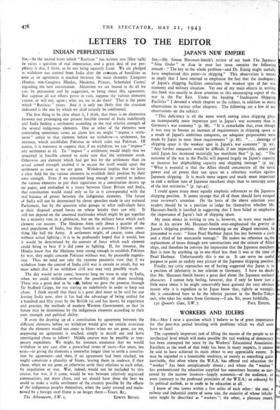INDIAN PERPLEXITIES
LETTERS TO
THE EDITOR
SIR,—In the second letter which " Rusticus " has written you (May 14th) he raises a question of real importance, and a great deal of our per- plexity is due, I think, to its not being squarely fixed. We are pledged to withdraw our control from India after fhb cessation of hostilities as boon as an agreement is reached between the main elements (Congress
• Hindus, non-Congress Hindus, Moslems, Princes, Scheduled Castes) regarding the new constitution. Meantime we are bound to do all we can, by persuasion and by suggestion, to bring about this agreement. But suppose all our efforts prove in vain, suppose the various elements cannot, or will not, agree ; what are we to do then? That is the point which " Rusticus " raises. And it is only too likely that the situation indicated is the one by which we shall actually be confronted.
The first thing to be clear about i"S, I think, that there is no alternative between our prolonging our present forcible control of India indefinitely and India finding a settlement according to the real relative strength of the several indigenous elements. One or other of the elements now contending sometimes raises an alarm lest we might " impose a settle- ment " unfair to that element before we withdraw—a settlement, for instance, which establishes Pakistan or which rules out Pakistan. Of course, it is nonsense to suppose that, if we withdraw, we can " impose " any settlement at all. To " impose " a settlements would imply that we remained in forcible control to make sure that the settlement stuck. Otherwise any element which had got less by the settlement than its actual armed strength enabled it to secure for itself would upset the settlement as soon as we are gone. Withdrawal implies that we leave a clear field for the various elements to establish their position by their own strength. Even if we remained long enough in control to induce the various elements to put their signatures to a constitution drawn up on paper, and embodied in a treaty between Great Britain and India, that constitution would stand only so far as it corresponded with the real balance of power between the indigenous elements. The future of India will not be determined by clever speeches made in any national Parliament, but by the question what groups or what individuals have at their disposal armed forces on whose loyalty they can rely. It will not depend on the unarmed multitudes which might be got together for a majority vote in a plebiscite, but on the military force which each clement can muster. The Moslems form only about a quarter of the total population of India, but they furnish at present, I believe, some- thing like half the Army. A settlement might, of course, come about without actual fighting ; it is to be profoundly hoped that it would, but it would be determined by the amount of force which each element could bring to bear if it did come to fighting. If, for instance, the Hindus knew that the Moslems were strong enough to establish Pakistan by war, they might concede Pakistan without war, by peaceable negotia- tion. :Thus we need not take the extreme pessimist view that if we withdraw from the control of India dill war is certain to result, but we must admit that if we withdraw civil war may very possibly result.
The day would never come, however long we were to stop in India, when we could withdraw without the possibility of chaos resulting. There was a great deal to be sae', before we gave the promise through Sir Stafford Cripps, for our staying on indefinitely in order to keep out chaos. I think myself that there is a great deal more to be said for our leaving India now, after it has had the advantage of being unified for
a hundred and fifty years by the British raj and has learnt, by experience and practice, the methods of modern Western Government, so that its future may be determined by the indigenous elements according to their own strength and political ability.
If even the drawing up of a constitution by agreement between the different elements before we withdraw would give no certain assurance that the elements would not come to blows when we are gone, are we, Supposing no agreement is reached, simply to march out and leave unmitigated chaos to follow? Middle courses may be possible as tem- porary expedients. We might, for instance, announce that we would withdraw in any case after a prescribed terms of years—five years, ten years—so giving the elements a somewhat longer time to settle a constitu- tion by agreement—and then, if no agreement had been reached, we might constitute a plurality of States, leaving them to coalesce, if they chose, when we are gone, or otherwise settle their relations to each other, by negotiation or war. War, indeed, would not be excluded by this course, but war, if it came, would be war between relatively organised communities, not mere chaos, and we should have done the best we could to make a stable settlement of the country possible by the efforts of the indigenous peoples themselves, when the unity created and main- tained by a foreign steel frame is no longer there.—Yours, &c.,


























 Previous page
Previous page